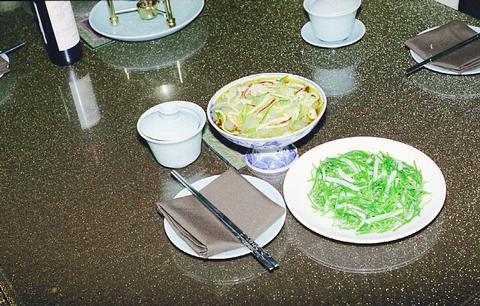Anho Road has never been short on chic spots, and China Pa, which has taken over the spacious premises of the Five Star beer house, has gone all out to impress.
Its entrance, secluded behind vines and iron fencing has a slight aura of the mysterious, and this has been skillfully enhanced by a long hall with museum-style lighting that highlights replicas of Han dynasty statuettes.
The walls of faux-bronze are set off by the tasteful off-white upholstery of the chairs and sofas, strongly suggesting sophistication and a dash of decadence.

PHOTO: IAN BARTHOLOMEW
According to Max Liu (劉明家), one of the young staff who run China Pa, "everything is for sale except the people," and said that a number of the carved wooden tables had been carried off by guests. The creative force behind the restaurant is Roxy Cheng (鄭德絮), formerly of So Moon (攬月) in Yangmingshan. The design of the bar, with its use of old Chinese medicine cabinets to store guest's personal bottles, and carved story windows lining the shelves, gives the bar a interesting look. On the design front, China Pa definitely has personality. Draft Boddington's is another attraction.
As for the food, Liu said that the menu is still in its developmental stage, but aims to focus on Taiwanese cuisine. The dishes currently available, while nothing particularly out of the ordinary, are well-prepared and elegantly presented. Simple dishes such as the fried vegetables with garlic and the hot spicy bean jelly (麻辣托皮) are both reasonably priced and tasty (NT$200 - NT$300 a dish), while the more showy dishes are less dependable at present.
The availability of a wine and cigar selection makes the most of the luxurious lounge area, which is ideal for sitting around and chatting after a meal. Currently the selection is slanted towards cheaper wines in the NT$1,500 range, and good Cubans can be had for NT$500 and upward.
Live music is provided between 9:15pm to just after midnight, ranging through vocals and instrumental jazz in half-hour sets. The jazz lounge effect is obviously something that China Pa is trying to achieve, but at present, it seems unsure exactly how to define itself, trying to offer a bit of everything.
As a stylish place to hang out and drink, China Pa definitely fits the bill, but it has yet to make its mark as a bar or restaurant. But judging from how far it has come in the two months since it opened, China Pa has considerable potential and deserves to be checked out.

Dissident artist Ai Weiwei’s (艾未未) famous return to the People’s Republic of China (PRC) has been overshadowed by the astonishing news of the latest arrests of senior military figures for “corruption,” but it is an interesting piece of news in its own right, though more for what Ai does not understand than for what he does. Ai simply lacks the reflective understanding that the loneliness and isolation he imagines are “European” are simply the joys of life as an expat. That goes both ways: “I love Taiwan!” say many still wet-behind-the-ears expats here, not realizing what they love is being an

Google unveiled an artificial intelligence tool Wednesday that its scientists said would help unravel the mysteries of the human genome — and could one day lead to new treatments for diseases. The deep learning model AlphaGenome was hailed by outside researchers as a “breakthrough” that would let scientists study and even simulate the roots of difficult-to-treat genetic diseases. While the first complete map of the human genome in 2003 “gave us the book of life, reading it remained a challenge,” Pushmeet Kohli, vice president of research at Google DeepMind, told journalists. “We have the text,” he said, which is a sequence of

Every now and then, even hardcore hikers like to sleep in, leave the heavy gear at home and just enjoy a relaxed half-day stroll in the mountains: no cold, no steep uphills, no pressure to walk a certain distance in a day. In the winter, the mild climate and lower elevations of the forests in Taiwan’s far south offer a number of easy escapes like this. A prime example is the river above Mudan Reservoir (牡丹水庫): with shallow water, gentle current, abundant wildlife and a complete lack of tourists, this walk is accessible to nearly everyone but still feels quite remote.

It’s a bold filmmaking choice to have a countdown clock on the screen for most of your movie. In the best-case scenario for a movie like Mercy, in which a Los Angeles detective has to prove his innocence to an artificial intelligence judge within said time limit, it heightens the tension. Who hasn’t gotten sweaty palms in, say, a Mission: Impossible movie when the bomb is ticking down and Tom Cruise still hasn’t cleared the building? Why not just extend it for the duration? Perhaps in a better movie it might have worked. Sadly in Mercy, it’s an ever-present reminder of just